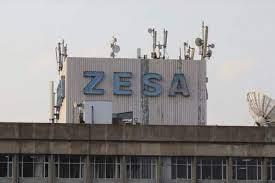News / National
Zimbabwe industries buckle under prohibitive power tariffs
06 Sep 2024 at 13:45hrs |
0 Views

Zimbabwe's industries have been severely affected by a sharp power tariff hike implemented in November, leading to a 15% rise in costs for mines and disrupting various sectors.
The 44% tariff increase has forced some mining companies to halt expansion projects, with chrome miners particularly hard hit. Farmers are also reconsidering the viability of certain crops due to rising electricity costs.
Economists warn that the country's growth targets are now at risk, compounded by a drought that has devastated crops.
Despite the tariff hike, Zesa, the power utility, struggles to meet its US$160 million monthly payments to Chinese lenders for loans funding the Hwange Power Station. Further tariff hikes may be needed to service the debt.
Mining companies, already facing falling mineral prices, are grappling with unsustainable electricity costs, which now account for up to 50% of production expenses in energy-intensive industries. The tariff also exceeds regional averages, adding to operational challenges.
The manufacturing sector is similarly affected, with businesses facing high operational costs, foreign currency shortages, and power outages.
Zesa reports that industries owe significant debts, and analysts suggest that the government's 3.2% growth target may be difficult to achieve under these conditions.
Business leaders warn of the knock-on effects of higher production costs, which could hurt local manufacturers and reduce consumer spending. Farmers are also urged to reassess production models in light of the new tariffs and smart meters that increase energy costs.
The 44% tariff increase has forced some mining companies to halt expansion projects, with chrome miners particularly hard hit. Farmers are also reconsidering the viability of certain crops due to rising electricity costs.
Economists warn that the country's growth targets are now at risk, compounded by a drought that has devastated crops.
Despite the tariff hike, Zesa, the power utility, struggles to meet its US$160 million monthly payments to Chinese lenders for loans funding the Hwange Power Station. Further tariff hikes may be needed to service the debt.
The manufacturing sector is similarly affected, with businesses facing high operational costs, foreign currency shortages, and power outages.
Zesa reports that industries owe significant debts, and analysts suggest that the government's 3.2% growth target may be difficult to achieve under these conditions.
Business leaders warn of the knock-on effects of higher production costs, which could hurt local manufacturers and reduce consumer spending. Farmers are also urged to reassess production models in light of the new tariffs and smart meters that increase energy costs.
Source - the independent
Join the discussion
Loading comments…





































